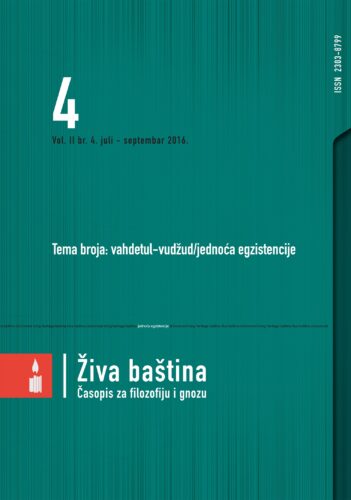U ovom radu razmotrit ćemo Mevlanin stih Mi smo nepostojanja i naše egzistencije / Ti si apsolutno postojanje naizgled prolazan. Moguća su dva različita pristupa: introvertni i ekstrovertni. Jezik koji objašnjava prvi pristup je mističan, psihološki ili poetičan. Ali, u izražavanju druge vrste pristupa, misticizam se nerijetko koristi fi lozofskim jezikom. Čini se da je Mevlanin jezik u ovim stihovima fi lozofski i stoga objašnjava ekstrovertni pristup. Da bi pojasnili ovo pitanje, pokušat ćemo odgovoriti na sljedeće:
1. Šta je pravo značenje jednoće egzistencije s Mevlaninog gledišta?
2. Šta je značenje “Apsolutnog Bića” u ovom stihu?
3. Šta Mevlana misli pod “nepostojanjem”?
4. Je li u ovom Mevlaninom stihu vidljiv utjecaj Ibn Arebija?
Razmotrit ćemo različite implikacije ovoga stiha prema drugim Mevlaninim stihovima, ali i različite pristupe čitanju ovog stiha koji se ne nalaze u Nicholsonovoj verziji Mesnevije.
Surveying Different Readings of a Verse of Mathnavi on “Unity of Being” (Wahdat al-Wujud)
In this article, we will discuss the verse: ” We and our existences are non-existences / Thou art the absolute Being which manifests the perishable. ” (Mathnavi vol. 1,verse 602). In this relation two different “unities” will be distinguished: ” introversive” and “extroversive”. The language which explains the first one is usually mystical, psychological or poetical. But in expressing the second type of unity, the mystics usually employ philosophical language. It seems that Mawlana’s language in above mentioned verse is philosophical and therefore he is explaining extroversive unity. For clarifying this point we try to answer the following questions:
1. What is the real meaning of “unity of Being” from Mawlana’s viewpoint?
2. What is the meaning of “absolute Being” in this verse?
3. What does Mawlana mean by “non-existence” ?
4. Is Mawlana influenced by Ibn Arabi in this verse?
We will discuss different implications of this verse according to Mawlana’s other verses. We will also discuss different readings of this verse which are other than Nicholson’s version.
[tags]

